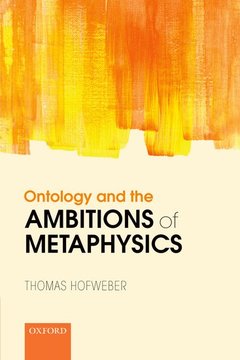Description
Ontology and the Ambitions of Metaphysics
Author: Hofweber Thomas
Language: English
Ontology and the Ambitions of Metaphysics
Publication date: 06-2018
382 p. · 15.6x23.4 cm · Paperback
Publication date: 06-2018
382 p. · 15.6x23.4 cm · Paperback
Ontology and the Ambitions of Metaphysics
Publication date: 08-2016
382 p. · 17.4x23.9 cm · Hardback
Publication date: 08-2016
382 p. · 17.4x23.9 cm · Hardback
Description
/li>Biography
/li>
Many significant problems in metaphysics are tied to ontological questions, but ontology and its relation to larger questions in metaphysics give rise to a series of puzzles that suggest that we don't fully understand what ontology is supposed to do, nor what ambitions metaphysics can have for finding out about what the world is like. Thomas Hofweber aims to solve these puzzles about ontology and consequently to make progress on four metaphysical debates tied to ontology: the philosophy of arithmetic, the metaphysics of ordinary objects, the problem of universals, and the question of whether the fact-like aspect of reality is independent of us. Crucial parts of the proposed solution involve considerations about quantification and its relationship to ontology, the place of reference in natural languages, the relationship between syntactic form and focus, whether there could be any ineffable facts, and others. Overall, Hofweber defends a rationalist account of arithmetic, an empiricist picture in the philosophy of ordinary objects, a restricted from of nominalism, and realism about reality, understood as all there is, but idealism about reality, understood as all that is the case. He defends metaphysics as having some questions of fact that are distinctly its own, with a limited form of autonomy from other parts of inquiry, but rejects several metaphysical projects and approaches as being based on a mistake.
Thomas Hofweber is professor of philosophy at the University of North Carolina at Chapel Hill. His research specializes in metaphysics and the philosophy of language. He studied for his undergraduate degree at the University of Munich, before completing his PhD at Stanford University. Before moving to North Carolina, he taught at the University of Michigan, Ann Arbor.
© 2024 LAVOISIER S.A.S.




